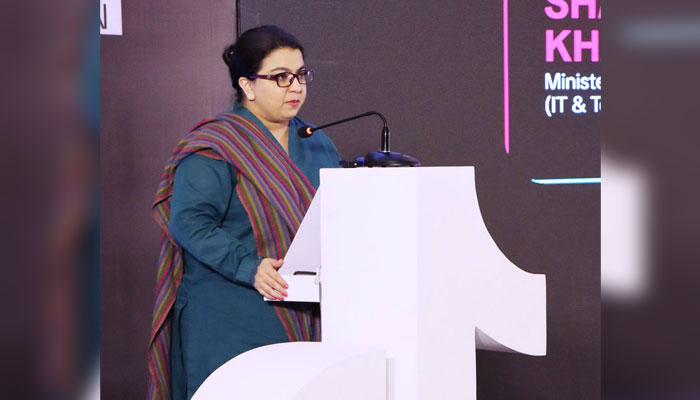Collaborative efforts for child online protection emphasised
Islamabad : Minister of State for Information Technology and Telecommunication, Shaza Fatima Khawaja on Thursday emphasised the need for strong collaboration at national and international levels to address the growing challenge of child online protection.
"We must unite our efforts to combat online threats and safeguard our children's future. Every child deserves a safe and secure digital world where they can learn, grow, and thrive," the minister said while addressing the Youth Safety Summit Pakistan, hosted by TikTok in collaboration with the Pakistan Telecommunication Authority (PTA). The event aimed to foster a safer digital environment for the youth.
She said that Australia has enacted legislation to regulate children's use of social media, while the United States has approved laws focused on online child protection. The minister highlighted the importance of raising awareness about responsible social media content creation and reaffirmed the government's commitment to ensuring the digital safety of Pakistan's youth. "In today's digital world, online threats are rapidly increasing, putting internet users'especially children and young people" at greater risk.
Due to their curiosity and innocence, children are particularly vulnerable to online dangers. As we advance technologically, it is imperative to address these concerns to protect our youth," Shaza Fatima said. She highlighted the government's efforts to enhance cybersecurity and improve Pakistan's digital ecosystem.
"Our country is proud of its growing cybersecurity infrastructure, increasing teledensity, expanding broadband penetration, and flourishing IT freelancing sector, all of which are largely driven by our youth," she added. The minister stressed that ensuring a safer cyberspace for children requires collective efforts from the public and private sectors, academia, research institutions, and civic innovators. She pointed out that broadband penetration in Pakistan has surged to around 57%, particularly after the COVID-19 pandemic, which accelerated the shift of education and business activities online.
To counter the accompanying rise in online threats, the government has implemented strong policy, regulatory, and technical measures. "I commend PTA and TikTok for organising this crucial summit and their remarkable efforts in promoting digital literacy. The ongoing Digital Literacy Program is reaching 100 government schools across Pakistan, including 40 schools in Sindh and Gilgit-Baltistan, benefiting 150,000 individuals," she said.
Shaza Fatima also highlighted PTA and TikTok's development of guidebooks and short awareness videos aimed at educating the public about online safety.
The minister said that PTA has established a dedicated committee on Child Online Protection (COP), working on national and international collaborations.
She lauded PTA?s efforts, which were recognized globally with the prestigious SAMENA Awards 2023-2024 in the Child Online Protection category and acknowledged at the ITU's 21st Council Working Group on COP meeting. She further highlighted Pakistan's improved ranking in the Global Cybersecurity Index (GCI), attributing the success to initiatives led by the Ministry of IT, PTA, FIA, and other stakeholders, particularly in child online protection.
The minister emphasized the country's strong IT talent pool, which includes over 600,000 professionals and 75,000 new graduates annually. She highlighted comprehensive government training initiatives targeting 200,000 youth in emerging technologies to build a future-ready workforce.
The Ministry of IT and Telecommunication is also advancing digital literacy, promoting STEM education, and providing training in e-learning, AI, cybersecurity, and data science. Furthermore, the ministry is committed to establishing research centres, such as the National Centre for Cyber Security (NCCS) and the National Centre of Artificial Intelligence, to align education with global demands for in-demand skills.
The minister reiterated the government's dedication to equipping the youth with the tools and knowledge necessary for a safer and prosperous digital future.
-
 Factory Explosion In North China Leaves Eight Dead
Factory Explosion In North China Leaves Eight Dead -
 Blac Chyna Opens Up About Her Kids: ‘Disturb Their Inner Child'
Blac Chyna Opens Up About Her Kids: ‘Disturb Their Inner Child' -
 Winter Olympics 2026: Milan Protestors Rally Against The Games As Environmentally, Economically ‘unsustainable’
Winter Olympics 2026: Milan Protestors Rally Against The Games As Environmentally, Economically ‘unsustainable’ -
 How Long Is The Super Bowl? Average Game Time And Halftime Show Explained
How Long Is The Super Bowl? Average Game Time And Halftime Show Explained -
 Natasha Bure Makes Stunning Confession About Her Marriage To Bradley Steven Perry
Natasha Bure Makes Stunning Confession About Her Marriage To Bradley Steven Perry -
 ChatGPT Caricature Prompts Are Going Viral. Here’s List You Must Try
ChatGPT Caricature Prompts Are Going Viral. Here’s List You Must Try -
 James Pearce Jr. Arrested In Florida After Alleged Domestic Dispute, Falcons Respond
James Pearce Jr. Arrested In Florida After Alleged Domestic Dispute, Falcons Respond -
 Cavaliers Vs Kings: James Harden Shines Late In Cleveland Debut Win
Cavaliers Vs Kings: James Harden Shines Late In Cleveland Debut Win -
 2026 Winter Olympics Snowboarding: Su Yiming Wins Bronze And Completes Medal Set
2026 Winter Olympics Snowboarding: Su Yiming Wins Bronze And Completes Medal Set -
 Trump Hosts Honduran President Nasry Asfura At Mar-a-Lago To Discuss Trade, Security
Trump Hosts Honduran President Nasry Asfura At Mar-a-Lago To Discuss Trade, Security -
 Cuba-Canada Travel Advisory Raises Concerns As Visitor Numbers Decline
Cuba-Canada Travel Advisory Raises Concerns As Visitor Numbers Decline -
 Anthropic Buys 'Super Bowl' Ads To Slam OpenAI’s ChatGPT Ad Strategy
Anthropic Buys 'Super Bowl' Ads To Slam OpenAI’s ChatGPT Ad Strategy -
 Prevent Cancer With These Simple Lifestyle Changes
Prevent Cancer With These Simple Lifestyle Changes -
 Air Canada Flight Diverted St John's With 368 Passengers After Onboard Incident
Air Canada Flight Diverted St John's With 368 Passengers After Onboard Incident -
 Experts Reveal Keto Diet As Key To Treating Depression
Experts Reveal Keto Diet As Key To Treating Depression -
 Inter Miami Vs Barcelona SC Recap As Messi Shines With Goal And Assist
Inter Miami Vs Barcelona SC Recap As Messi Shines With Goal And Assist




